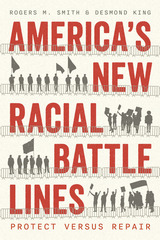5 books about African American college presidents
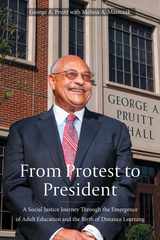
From Protest to President
A Social Justice Journey through the Emergence of Adult Education and the Birth of Distance Learning
George A Pruitt
Rutgers University Press, 2023
From Protest to President describes an inspirational odyssey of a young, Black activist coming of age in Mississippi and Chicago in the tumultuous 1960s and '70s, culminating in a notable thirty-five-year presidency at Thomas Edison State University.
From barbershop encounters with Malcolm X to death threats at Illinois State University and gunfire at Towson State, Pruitt provides a powerful narrative poised at the intersection of social justice, higher education and politics. He recounts leadership experiences at HBCUs and public universities across the country, as he advocated for autonomy at Morgan State and fought to preserve Tennessee State University.
His steadfast activism, integrity and courage led to groundbreaking work in providing access to higher education for working adults and the military.
From his days as a student protester in high school and college to his appearances on Capitol Hill, Pruitt has earned the reputation as a candid and influential leader in higher education.
From barbershop encounters with Malcolm X to death threats at Illinois State University and gunfire at Towson State, Pruitt provides a powerful narrative poised at the intersection of social justice, higher education and politics. He recounts leadership experiences at HBCUs and public universities across the country, as he advocated for autonomy at Morgan State and fought to preserve Tennessee State University.
His steadfast activism, integrity and courage led to groundbreaking work in providing access to higher education for working adults and the military.
From his days as a student protester in high school and college to his appearances on Capitol Hill, Pruitt has earned the reputation as a candid and influential leader in higher education.
[more]
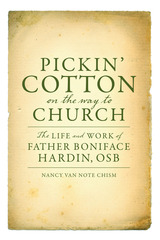
Pickin’ Cotton on the Way to Church
The Life and Work of Father Boniface Hardin, OSB
Nancy Van Note Chism
Indiana Historical Society Press, 2019
Pickin’ Cotton on the Way to Church highlights the life of Father Boniface Hardin, a Benedictine monk. James Dwight Randolph (Randy) Hardin was born on November 18, 1933, in Bardstown, Kentucky, educated in Catholic schools in Kentucky, and thirteen years old when he asked to become a priest. Excluded from the seminaries in Kentucky because of his race, he enrolled in Saint Meinrad Seminary in Spencer County, Indiana, which had just started accepting black students. After six years of study he took his vows as monk and was given the name Boniface. He was ordained a priest in 1959 and attained a graduate degree in 1963.
In 1965 Father Hardin accepted the position of associate pastor at Holy Angels Catholic Church, a predominately black parish in Indianapolis. Father Hardin was a social activist who spoke out against poverty, segregation, police brutality, and fought against the construction of an interstate highway that would adversely affect the black community. Such actions were considered inappropriate for a priest and the Archbishop of Indianapolis removed him from his position at Holy Angels.
Although reinstated due to public outcries, Father Hardin soon left Holy Angels, and, along with Sister Jane Shilling, opened the Martin Center, where they could advocate full time for the poor and disenfranchised through a series of programs and services. Realizing the correlation between education and career advancement, Father Boniface and Sister Jane founded Martin University, the only predominately African American institution of higher learning in Indiana. The university continues to play a unique role in the community, with a special focus on educational opportunities to those who have been too often discounted, discouraged, and disregarded by society.
Although Father Hardin was widely known in Indiana during his lifetime, accumulating many awards and honors, it is important to document his life and work for posterity. It is hoped that this volume will provide an overview of his story and lay the foundation for other scholarly efforts.
[more]
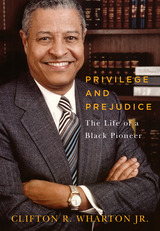
Privilege and Prejudice
The Life of a Black Pioneer
Clifton R. Wharton
Michigan State University Press, 2015
Privilege and Prejudice is a stereotype-defying autobiography. It reveals a Black man whose good fortune in birth and heritage and opportunity of time and place helped him to forge breakthroughs in four separate careers. Clifton R. Wharton Jr. entered Harvard at age 16. The first Black student accepted to the School of Advanced International Studies at Johns Hopkins, he went on to receive a doctorate in economics from the University of Chicago—another first. For twenty-two years he promoted agricultural development in Latin America and Southeast Asia, earning a post as chairman of the Rockefeller Foundation. He again pioneered higher education firsts as president of Michigan State University and chancellor of the sixty-four-campus State University of New York system. As chairman and CEO of TIAA-CREF, he was the first Black CEO of a Fortune 500 company. His commitment to excellence culminated in his appointment as deputy secretary of state during the Clinton administration. A remarkable story of persistence and courage, Privilege and Prejudice also documents the challenges of competing in a society where obstacles, negative expectations, and stereotypical thinking remained stubbornly in place. An absorbing and candid narrative, it describes a most unusual childhood, a remarkable family, and a historic career.
[more]
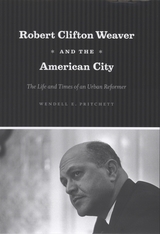
Robert Clifton Weaver and the American City
The Life and Times of an Urban Reformer
Wendell E. Pritchett
University of Chicago Press, 2008
From his role as Franklin Roosevelt’s “negro advisor” to his appointment under Lyndon Johnson as the first secretary of Housing and Urban Development, Robert Clifton Weaver was one of the most influential domestic policy makers and civil rights advocates of the twentieth century. This volume, the first biography of the first African American to hold a cabinet position in the federal government, rescues from obscurity the story of a man whose legacy continues to affect American race relations and the cities in which they largely play out.
Tracing Weaver’s career through the creation, expansion, and contraction of New Deal liberalism, Wendell E. Pritchett illuminates his instrumental role in the birth of almost every urban initiative of the period, from public housing and urban renewal to affirmative action and rent control. Beyond these policy achievements, Weaver also founded racial liberalism, a new approach to race relations that propelled him through a series of high-level positions in public and private agencies working to promote racial cooperation in American cities. But Pritchett shows that despite Weaver’s efforts to make race irrelevant, white and black Americans continued to call on him to mediate between the races—a position that grew increasingly untenable as Weaver remained caught between the white power structure to which he pledged his allegiance and the African Americans whose lives he devoted his career to improving.
Tracing Weaver’s career through the creation, expansion, and contraction of New Deal liberalism, Wendell E. Pritchett illuminates his instrumental role in the birth of almost every urban initiative of the period, from public housing and urban renewal to affirmative action and rent control. Beyond these policy achievements, Weaver also founded racial liberalism, a new approach to race relations that propelled him through a series of high-level positions in public and private agencies working to promote racial cooperation in American cities. But Pritchett shows that despite Weaver’s efforts to make race irrelevant, white and black Americans continued to call on him to mediate between the races—a position that grew increasingly untenable as Weaver remained caught between the white power structure to which he pledged his allegiance and the African Americans whose lives he devoted his career to improving.
[more]

Speechifying
The Words and Legacy of Johnnetta Betsch Cole
Johnnetta Betsch Cole. Celeste Watkins-Hayes and Erica Lorraine Williams, editors
Duke University Press, 2023
Speechifying collects the most important speeches of Dr. Johnnetta Betsch Cole—noted Black feminist anthropologist, the first Black female president of Spelman College, former director of the Smithsonian Institution's National Museum of African Art, and former chair and president of the National Council of Negro Women. A powerful and eloquent orator, Dr. Cole demonstrates her commitment to the success of historically Black colleges and universities, her ideas about the central importance of diversity and inclusion in higher education, the impact of growing up in the segregated South on her life and activism, and her belief in public service. Drawing on a range of Black thinkers, writers, and artists as well as biblical scripture and spirituals, her speeches give voice to the most urgent and polarizing issues of our time while inspiring transformational leadership and change. Speechifying also includes interviews with Dr. Cole that highlight her perspective as a Black feminist, her dedication to public speaking and “speechifying” in the tradition of the Black church, and the impact that her leadership and mentorship have had on generations of Black feminist scholars.
[more]
READERS
Browse our collection.
PUBLISHERS
See BiblioVault's publisher services.
STUDENT SERVICES
Files for college accessibility offices.
UChicago Accessibility Resources
home | accessibility | search | about | contact us
BiblioVault ® 2001 - 2024
The University of Chicago Press





